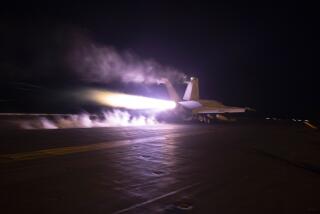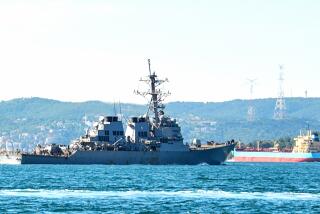Suicide bomber attacks British ambassador’s motorcade in Yemen
Reporting from Cairo — The attempted assassination of the British ambassador to Yemen on Monday indicated that Al Qaeda remains capable of striking Western targets despite the arrests of some of its leaders and raids against its mountainous strongholds in the Arabian Peninsula.
A lone suicide bomber exploded alongside the armored car carrying Ambassador Timothy Torlot on his morning drive to the British Embassy in the capital, Sana. The ambassador and other British officials were unharmed. Police initially said the bomber, whose name was not released, was the only casualty.
Reuters reported that three people, including two policemen escorting the ambassador’s motorcade, were injured. The neighborhood where the attack occurred is packed with tea shops and markets.
“There was a small explosion beside the British ambassador’s car. He was unhurt. No other embassy staff or British nationals were injured,” said a spokesman for the British Foreign Office. “The embassy will remain closed to the public for the time being.”
The attack came as the Yemen military -- backed by U.S. funding, training and intelligence -- has been targeting Al Qaeda in the Arabian Peninsula. The Yemen-based group, which had a resurgence several years ago, has claimed responsibility for the failed Christmas Day bombing of a U.S. airliner and is believed to have orchestrated the botched assassination of a Saudi prince.
Washington is concerned that the Al Qaeda branch will create further instability and bloodshed at the crossroads of the Middle East and the Horn of Africa. The Pentagon is increasing security assistance to Sana this year to $150 million, up from $67 million, including funding for Yemen’s special forces that have stepped up attacks on the terrorist group following U.S. pressure on President Ali Abdullah Saleh.
Earlier this month, President Obama ordered the capture or killing of a U.S.-born Muslim cleric, Anwar Awlaki, who reportedly is operating in Yemen. Awlaki had links to the Nigerian student accused of attempting to blow up a U.S. airliner this past Christmas Day and was in e-mail contact with Nidal Malik Hasan, an Army major charged in 2009 with killing 13 people on a rampage at Ft. Hood, Texas.
American intelligence officials regard Yemen’s Al Qaeda branch, made up mainly of Yemenis and Saudis, as a major threat to U.S. regional interests. Washington has been skeptical of Saleh’s government, which for years appeared to tolerate militants as long as they carried out attacks in other countries. Sana’s sentiments appeared to shift in late 2009, however, when the terrorist group became a threat to Saleh, who also was contending with a civil war in the north and a secessionist movement in the south.
The British Foreign Office website states: “We believe that terrorists continue to plan attacks. Attacks could be indiscriminate, including against Western and British interests, such as residential compounds, military and oil facilities, and transport and aviation interests.”
More to Read
Sign up for Essential California
The most important California stories and recommendations in your inbox every morning.
You may occasionally receive promotional content from the Los Angeles Times.











